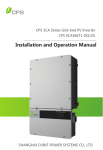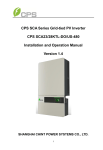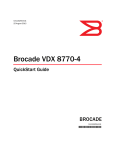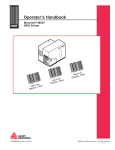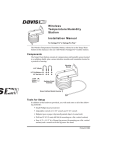Download DAVIS Daytime Fan Aspirated Radiation Shield Kit Installation manual
Transcript
Dayt i m e Fa n - A s pir ate d Radiation Shield Kit Installation Manual for Vantage Pro & Vantage Pro Plus Stations Introduction These instructions describe how to upgrade a non-aspirated Vantage Pro radiation shield to a Daytime Fan-Aspirated Radiation Shield. The upgrade kit can be installed on any Vantage Pro® or Vantage Pro Plus Integrated Sensor Suite (ISS) equipped with a round-plate non-aspirated, radiation shield. The round-plate non-aspirated radiation shield replaced the previous square-plate shield at the beginning of 2003. Note: The Daytime Fan-Aspirated Radiation Shield Kit can only be installed on round-plate non-aspirated radiation shields. Components The upgrade kit includes the items shown in “Figure 1” and “Figure 2”. Closed Cap Plate Fan Unit Solar Panel & Mounting Bracket Open Cap Plate Fan Plate Open Plate Figure 1. Daytime Fan Kit Components Product # 7745 #8-32 x 1/2" Screws (3) #8-32 x 3-1/4" Screws (3) Threaded Spacers (3) Power Cable Assembly #8 Split-Lock Washers (6) Cable Tie Mount #8 Flat Washers (6) #4 x 3/8" Screw #4 Flat Washer Cable Clamp 4" Cable Tie 12" Cable Ties (2) Figure 2. Daytime Fan Kit Hardware Tools Needed You may need some or all of the following tools and other items to complete the upgrade: • A medium Phillips-Head screwdriver • A medium slot-tip screwdriver • Cabled ISS Only: Wire cutters • Other tools as required to remove and re-mount the ISS • Wireless ISS Only: CR-123A 3-volt lithium battery (optional) Note: If you are upgrading an ISS that has been in service for a year or more, you should consider changing the ISS battery during the upgrade. Installation Over view Installing the Daytime Fan Kit is not very complicated and should take only 30 to 60 minutes to complete. These are the steps to install the Daytime Fan components: 1. 2. 3. 4. 5. 6. 7. 8. 9. 2 Put the console into Setup Mode. Take the ISS down from its installed position. Disassemble the standard radiation shield. Remove the solar panel if you have a Wireless ISS. Assemble the lower section of the fan-aspirated shield. Install the fan unit. Assemble the upper section of the fan-aspirated shield. Re-Install the ISS. Take the console out of Setup Mode. Installing the Daytime Fan Kit Put Console in Setup Mode 1. At your Vantage Pro console, press and hold the DONE key and then press the key to put the console in Setup Mode. This prevents the reception of erroneous data from the rain collector while you are removing the ISS. Note: If the console acquires erroneous data during the upgrade, refer to “Take the Console Out of Setup Mode” on page 14 for instructions on clearing data. Additional information on clearing and setting console data can be found in the “Vantage Pro Console Manual.” Take Down the ISS CAUTION: Please work on your Vantage Pro ISS in a safe place. We strongly recommend that you take down the ISS before beginning the upgrade. If you are installing the Daytime Fan Kit on an ISS that has already been placed into service, you will need to take down the ISS and move it to a convenient and safe place to perform the installation. 1. At the ISS, open the Sensor Interface Module (SIM) housing cover and disconnect the WIND (anemometer) cable. Note: The SIM housing is located on the bottom of the radiation shield. Cable Routing Channels (press cables fully into channel) Optional UV SUN 3-Volt Lithium Battery (Wireless ISS Only) Solar Panel Power (Wireless ISS Only) AC Power (optional) RAIN WIND TEMP HUM Console Cable (Cabled ISS Only) DIP Switches (Wireless ISS Only) SIM Housing Figure 3. SIM Connections 2. Cabled ISS Only: Disconnect the console cable from the SIM. 3. You can now remove the ISS from its mounted position. Move it to a safe place to install the kit components. 3 Disassemble the Standard Radiation Shield Note: We recommend using a workbench or table to perform the following procedures. 1. 2. 3. 4. 5. Turn the ISS upside down with the rain collector cone on the bottom. Disconnect the RAIN cable and, if present, disconnect the SUN and UV cables from the SIM. Wireless ISS Only: Disconnect the solar power cable. Turn the ISS right-side up with the cone on top. Remove the rain collector cone from the ISS base by rotating the cone counter-clockwise. When the cone’s latches line up with openings in the base, you can lift the cone off. The cone fits in the base tightly and may require extra pressure to remove the first few times. See Figure 4. Tip: 6. Twist to Open Figure 4. Remove Rain Collector Cone Steady the ISS base between your knees when removing the cone. Remove the three 8-32 x 4” screws holding the radiation shield plates together. Save these three screws for use in the next procedure, “Assembling the Lower Shield.” #8-32 x 4" Screw #8 Lock Washer #8 Flat Washer ISS Base Top Plate with Insulating Disk Radiation Shield Open Plates Temp/Hum Sensor Figure 5. Standard Radiation Shield Assembly Diagram 4 Bottom Plate with SIM Housing Temp/Hum Cable 7. Route the RAIN cable behind the drain and out the hole near the drain. ISS Base Rain Collector Tipping Bucket Drain RAIN Cable Install Cable Tie Mount Here Route Cable Here Figure 6. Route RAIN Cable Around Drain and through Hole 8. Place the adhesive-backed cable tie mount next to the hole near the drain, and secure the cable with the small cable tie. Cable Tie RAIN Cable Figure 7. Secure the RAIN Cable Cable Tie Mount Route Cable Through Hole Wireless ISS Only: Remove the Solar Panel Note: A new solar panel included with the kit replaces the original solar panel. 1. 2. 3. Insert a slot-tip screwdriver between the solar panel retaining tabs and the solar panel. See Figure 8. . Pry the retaining tabs out just enough to free the solar panel. Lift the solar panel straight up to remove it from the ISS base. 3 Lift solar panel to remove. Solar Panel Solar Panel Retaining Tabs 2 Pry tab out to release solar panel. 1 Insert screwdriver between tab and solar panel. Figure 8. Remove the Solar Panel 5 Assemble the Lower Section 1. The top plate in the ISS radiation shield has a thick, insulating disk attached on the underside. Remove the two screws holding the insulating disk and discard the disk. Save the top plate for use in Step 3. Top Plate Insulating Disk Figure 9. Remove the Insulating Disk 2. Remove the Temp/Hum sensor from the bottom plate. Screws (3) Flat Washer Temp/Humidity Sensor Cable Clamp Cable Clamp Mounting Hole Figure 10. Temp/Hum Sensor Removal and Installation 3. Using the same screws and orientation, install the Temp/Hum sensor on the top plate from Step 1. Note: The cable clamp mounting hole is missing from the closed plates on early production models. If it is missing on your ISS, discard the clamp and hardware. The extra strain relief provided by the clamp will not be necessary for most applications. 6 4. 5. Start building the lower section of the new radiation shield with the original bottom plate. Place the new Temp/Hum plate from Step 3 and two open plates on top of the bottom plate. Note: When stacking plates, make sure the screw bosses (holes) line up with each other. Open Plate TEMP HUM Sensor Cable Open Plate 6. Run the TEMP HUM cable over the top of second open plate directly above the cable port openings in the SIM housing. 7. Place the third open plate on the stack. 8. Using the #8-32 x 1/2” screws and three of the #8 washers and #8 lock washers included with the kit, attach the three threaded spacers to the fan plate. See Figure 11. 9. Place a #8 lock washer and then a # 8 flat washer on one of the 4” screws removed from the original radiation shield. 10. Insert the 4” screw with washers into one of the radiation shield plate holes located just counter-clockwise from a threaded spacer. Open Plate Closed Plate with Temp/Hum Sensor Closed Plate with SIM Note: Route TEMP HUM Sensor Cable out on the Cable Port Side of the SIM Housing SIM Cable Port Openings SIM Housing Threaded Spacers (3) Figure 11. Radiation Shield Lower Section Assembly Diagram Fan Plate #8 Flat Washer #8 Lock Washer #8-32 x 1/2" Screw Figure 12. Install Threaded Spacers 7 11. Lower the Fan Plate onto the stack making sure the screw goes through the boss in each of the plates and lines up with the threaded insert located in the bottom plate. #8-32 x 4" Screws (3) #8 Lock Washer #8 Flat Washer Fan Plate Screw Boss Threaded Insert in Bottom Plate Figure 13. Install Fan Plate 12. Turn the screw a few times to engage the threaded insert in the bottom plate. 13. Make sure the other screw bosses are aligned and then insert the other two 4” screws with a lock washer and washer in the same way. 14. Tighten all three screws to securely fasten the bottom section of the radiation shield. 8 Install the Fan Unit 1. Place the fan unit into the center of the fan plate. See Figure 14. Solar Panel & Mounting Bracket Fan Unit Fan Cable Solar Power Cable 3-Pin Connector 2-Pin Connector Put Power Cable Clamp Here Power Cable Assembly Important - Cabled ISS Only!! Cut Connector Module off the Power Cable Assembly before connecting fan or solar panel. Keep the Connector Module Cut Here Discard the rest of the cable Figure 14. Install Fan Unit 2. 3. 4. Cabled ISS Only: Because the SIM in a cabled ISS receives power from the console, we recommend you cut the power cable next to the connector module and discard the cable. Save the connector module for use in Steps 3 and 4. See Figure 14. Plug the fan cable into the 3-pin connector on the connector module. Plug the solar panel cable into the 2-pin connector on the connector module. 9 5. Tuck the cables behind the spacer as shown in Figure 15.. Threaded Spacer Connector Module Solar Power Cable Fan Unit Cable Cable Clamp Power Cable to SIM (Wireless ISS Only) Figure 15. Clamp Power Cable and Solar Power Cable 6. 7. Secure the power cable and solar power cable to the fan plate using the cable clamp, #4 screw and washer included with the kit. Make sure the fan blades rotate in a counter-clockwise direction by taking the radiation shield assembly to an area exposed to sunlight or by shining a bright incandescent light on the solar panel. If the fan blades rotate in the wrong direction, check the fan and solar power cables for a reversed connection. Note: The fan must rotate in a counter-clockwise direction in order to operate effectively. 10 Assemble the Upper Section 1. 2. Place the open cap plate (has hole in center) on top of the fan plate, then place the closed cap plate (no hole). See Figure 18. ‘ Upper Shield Assembly” on page 12. Place the solar panel bracket on top of the stack with the panel located near the hinge side of the SIM housing. Line up the screw bosses in the radiation shield stack with the solar panel mounting bracket holes. See Figure 16. Solar Panel Mounting Bracket Radiation Shield Mounting Holes (3) Figure 16. Radiation Shield Mounting Holes in Solar Panel Bracket 3. 4. Place a lock washer and then a washer on a 3 1/4” screw. Insert the screw into the ISS base using the hole indicated for the first screw. See Figure 17. . Radiation Shield Mounting Holes (3) First screw goes here Figure 17. Radiation Shield Mounting Holes in ISS base 11 Insert this screw first #8-32 x 3-1/4" Screws (3) 5. 6. 7. Lower the ISS base onto the stack so that the screw goes into the boss nearest the solar panel.Turn the screw a few times to engage the threads. Place a lock washer and washer on the other two 3 1/4” screws then insert them through the remaining two screw holes. Tighten all three screws to securely fasten the radiation shield and solar panel bracket to the ISS base. #8 Lock Washers #8 Flat Washers ISS Base Rain Collector Cable Solar Panel & Bracket Closed Cap Plate (no hole) Solar Power Cable Open Cap Plate (hole in center) Fan Plate Power Cable (Wireless ISS Only) Figure 18. Upper Shield Assembly 12 Re-Install the ISS 1. Install the rain collector cone and turn the ISS upside down. Open the SIM cover and connect the TEMP/HUM and RAIN sensor cables. If installed on your station, connect cable for the UV and SUN sensors. 2. 3. Cable Routing Channels (press cables fully into channel) Optional 3-Volt Lithium Battery (Wireless ISS Only) UV SUN RAIN WIND Power Cable (Wireless ISS Only) AC Power (optional) Console Cable (Cabled ISS Only) TEMP HUM DIP Switches (Wireless ISS Only) Figure 19. SIM Cable Connections 4. Wireless ISS Only: Connect the power cable. 5. Close the SIM cover. Re-install the ISS in its previous location. 7. Open the SIM cover and connect the WIND (anemometer) cable. 8. Cabled ISS Only: Connect the console cable. 9. Close the SIM cover and fasten the cover using two #6 x 1/2” (3.5mm x 12mm) self-threading screws. Without the screws the SIM cover can be blown off the housing in extremely windy conditions. 10. Use cable ties to secure cables. 6. Guidelines for Securing Cables • Secure cables so they will not whip about in the wind. • Secure cables to metal poles by using a cable tie or by wrapping electrical tape around them both. Cable Tie Cable Clip Figure 20. Securing Ca • Place clips or ties approximately every 3 to 5 feet (1 to 1.6 m). • If needed, additional cable ties, cable tie mounts, and other hardware can be obtained at a hardware or electronics store. Note: Do not use metal staples or a staple gun to secure cables. Metal staples—especially when installed with a staple gun—have a tendency to cut the cables. 13 Take the Console Out of Setup Mode 1. 2. At your Vantage Pro console, press the DONE key to take the console out of Setup Mode. Check the console for erroneous rain data and clear if necessary. To clear erroneous data: a. Select the weather variable to be cleared. b. Press and release the 2ND key, then immediately press and hold the CLEAR key. The daily rain reading will start blinking. c. Keep holding CLEAR until the reading changes to zero. d. Refer to your Vantage Pro Console Manual for more information on setting 3. and clearing weather variables. Congratulations! You have completed the upgrade and can now enjoy your daytime fan-aspirated radiation shield. Maintenance • Keep the surfaces of the ISS clean, since the radiation shield and solar panel are less effective when dirty. Remove dust from the solar panel and radiation shield with a damp cloth. • Remove any debris obstructing air flow through the radiation shield such as leaves, twigs, webs, and nests. • Do not spray the ISS with insecticides of any kind. Some insecticides can damage the sensors and even damage the radiation shield. Annual Maintenance We recommend cleaning out any debris that may have accumulated inside the radiation shield and replacing the motor (# 7758) on an annual basis. 1. 2. 3. 4. 5. 6. 7. 8. 14 Remove your fan-aspirated ISS and place on a stable work surface. Disassemble the radiation shield. Remove any debris lodged inside the unit. Clean the surfaces of the radiation shield with a damp cloth. Unplug the old fan unit and remove from it from the radiation shield. Install the new fan unit (#7758) and plug it into the Junction Board. Assemble the Radiation Shield. Re-install the ISS in its previous location. Troubleshooting If you are experiencing problems performing the upgrade or have problems with your Daytime Fan-Aspirated Radiation Shield, first be sure to check all cable connections. If you are unable to solve the problem, please call Davis Technical Support. We’ll be glad to help. Most questions can be answered over the phone. You can also email us for support or visit our website. Sorry, we are unable to accept collect calls. Note: Please do not return items to the factory for repair without prior authorization. Contacting Davis Instruments (510) 732-7814 for Technical Support, Monday – Friday, 7:00 a.m. – 5:30 p.m. Pacific Time. (510) 670-0589 – Fax to Customer Service or Tech Support. [email protected] – E-mail to Technical Support. [email protected] – General e-mail. www.davisnet.com – Copies of user manuals and other product documents are avail- able on the “Support” page. Watch for FAQs and other updates. Subscribe to the e-newsletter. 15 © Davis Instruments Corp. 2003-2004. All rights reserved. Daytime Fan-Aspirated Radiation Shield Kit Installation Manual Rev B, January 16, 2004 Document: 07395.033 Product: 7745 Vantage Pro is a registered trademark of Davis Instruments Corp. This product is protected in the United States by Patent Number 6,247,360. 3465 Diablo Avenue, Hayward, CA 94545-2778 U.S.A. 510-732-9229 • Fax: 510-732-9188 E-mail: [email protected] • www.davisnet.com

















